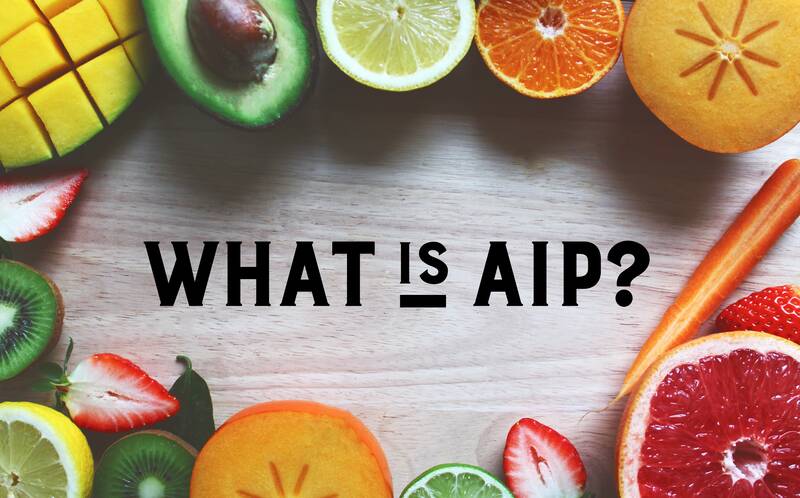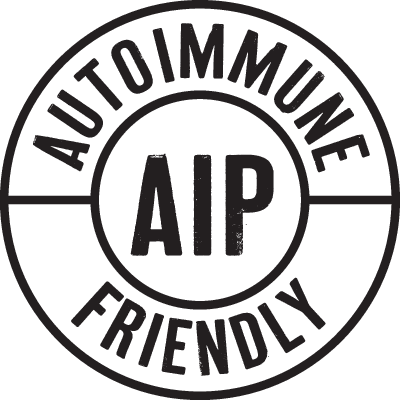What is the Autoimmune Protocol (AIP)?
AIP stands for the Autoimmune Protocol — an elimination diet designed to help manage the symptoms of autoimmune diseases like psoriasis, lupus, and rheumatoid arthritis (among many dozens of others). Although the AIP doesn't “cure” autoimmunity in the traditional sense, it can reduce flare-ups by removing the common culprits behind leaky gut and inflammation, both of which set the stage for autoimmune response.

What exactly is autoimmune disease?
For most people, the immune system is able to distinguish between healthy host cells and foreign invaders. And when it makes a mistake, fail-safes kick in to suppress a full-fledged immune reaction.
For a small portion of the population, though, a convergence of genetic and environmental factors makes them susceptible to autoimmune disease — in which the immune system identifies healthy tissue as harmful, causing the body to chronically attack its own cells. This leads to ongoing tissue damage that produces the symptoms of disease.
Although the exact cause of autoimmune disease isn't known, it's significantly more common in women (suggesting a role of hormones), often runs in families (underscoring the role of genetics), and may potentially be triggered by infection (like a bout with strep throat), physical stress (like repeated injury to a particular part of the body), and some medications (such as antibiotics).
How is the AIP different from the paleo diet?
The AIP is ultimately a stricter version of the paleo diet. Both diets embrace a variety of red meats, poultry, seafood, fruit, leafy greens, and many other vegetables. Likewise, both diets eliminate certain food categories: grains, legumes, refined sugar, artificial sweeteners, chemical additives, artificially hydrogenated trans fats, refined vegetable oils, and most dairy products.
However, the AIP also excludes a number of otherwise paleo-friendly items, including eggs, nightshade vegetables (tomatoes, eggplant, potatoes, and peppers), nuts, seeds, coffee, and chocolate.
Often, people with autoimmune disease can reintroduce some of these foods without triggering symptoms. This list is simply a starting place, used in the initial “elimination” phase of the AIP.
Why do some people need to avoid these foods?
Although the above foods aren't problematic for otherwise healthy people, they can cause trouble in the context of autoimmune disease. For example, nightshade vegetables (like potatoes) contain glycoalkaloids — compounds that can widen the tight junctions that normally “seal up” the gut, allowing food particles, bacteria, and other foreign substances to enter the bloodstream. This can trigger an inflammatory response that worsens the already over-inflammatory state involved in autoimmune tissue damage.
Some of these foods, such as tomatoes, also contain compounds capable of stimulating the immune system — something that most people can handle just fine, but that may exacerbate existing autoimmunity (where the immune system is already over-reactive!).
Other foods on this list, such as eggs and tree nuts, are among the more common food allergens. For some people, avoiding them can help reduce unnecessary immune responses in the body.
(It's worth noting that while eliminating the above foods can help manage autoimmune diseases, eating these foods won't cause autoimmune disease in otherwise healthy individuals. The AIP is designed for symptom management, not disease prevention!)

Are our products AIP-friendly?
Currently, we offer several AIP-friendly soups, following the elimination phase guidelines as described by What is The Autoimmune Protocol and The Definitive Guide - Autoimmune Wellness.
However, not all of our products adhere to AIP guidelines. This is because we champion nutritional diversity over dietary strictness — which means eating the widest variety of nutrient-dense plant and animal foods possible (in fact, research suggests that eating at least 30 different foods per week is the sweet spot for optimal health!). While an AIP diet can be immensely beneficial for managing autoimmune diseases, there's no reason to eliminate otherwise nutrient-dense foods for people who don't truly need to.
Ultimately, we strive to serve everyone we can, on whatever wellness journey they've embarked on — AIP included.